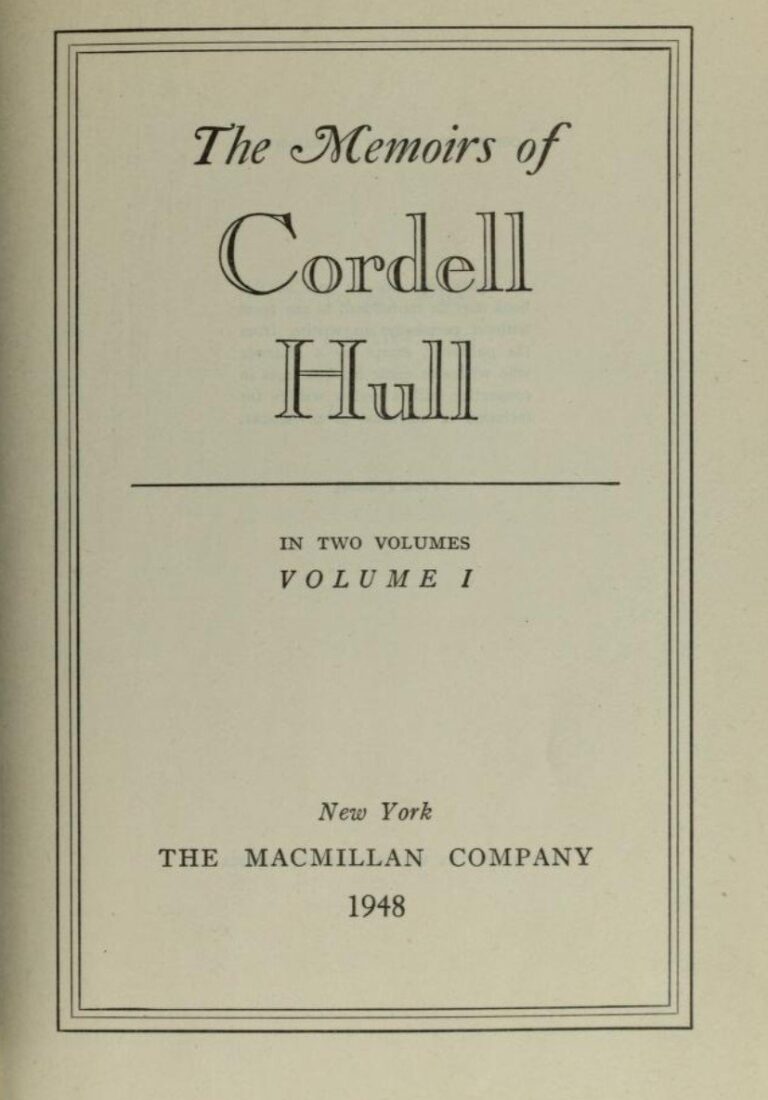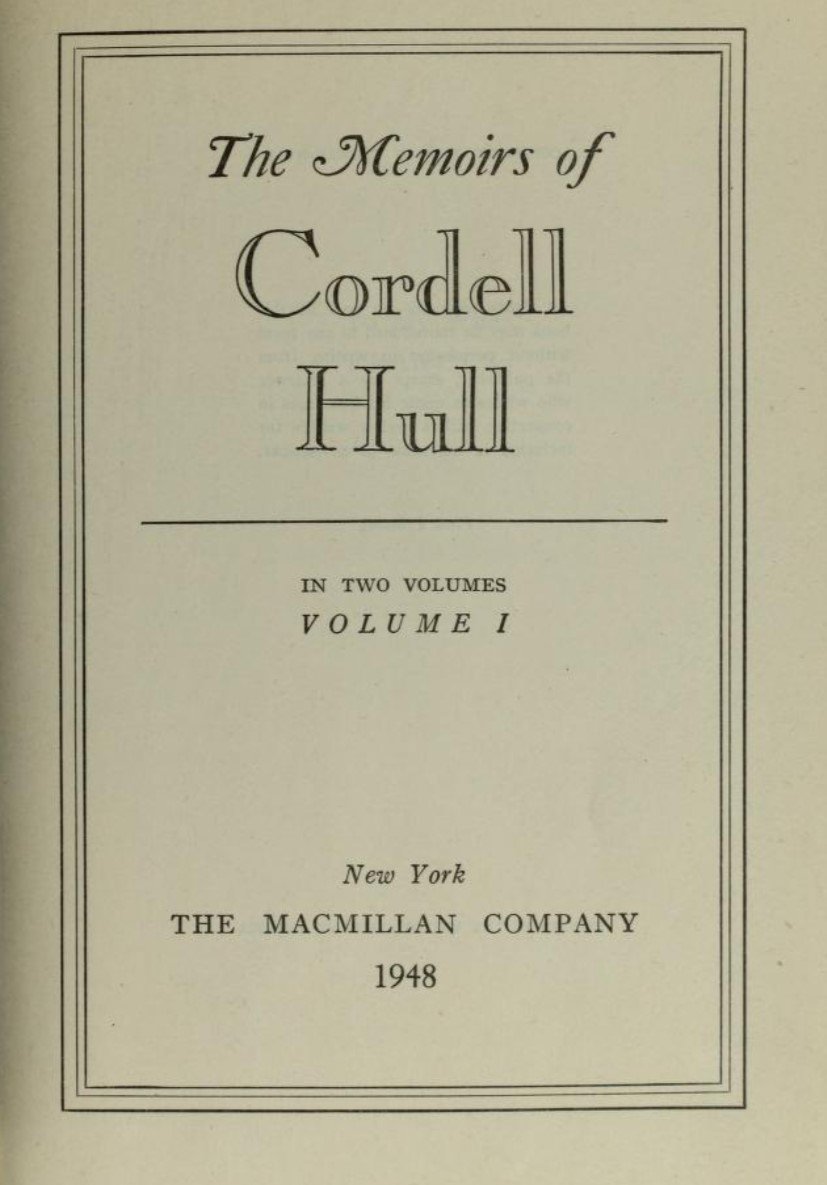Cordell Hull, The Memoirs of Cordell Hull (1948)
Cordell Hull was the longest tenured US Secretary of State, serving as part of the Roosevelt Administration between 1933-1944.
Born in an archetypal log cabin in Tennessee in 1871, Hull grew up in modest circumstances as the son of a farmer. He received his primary education in a one-room school his father had personally built, and quickly demonstrated academic talents that would see him obtain a law degree and be admitted to the Bar at just the age of 20.
Politically active from a young age, Hull became a member of the Democratic Party that had been dominant in the American South since before the Civil War. Nevertheless, Hull came to represent a specific strand of classically liberal Democratic politics associated with a New Yorker in President Grover Cleveland, whom he campaigned for in 1888. Entering the House of Representatives in 1907, Hull quickly emerged as a champion of Free Trade, which had been one of Cleveland’s defining issues.
In 1930, Hull moved to the more prestigious Senate, but he soon resigned to take up the Secretary of State position offered to him by Roosevelt, for whom Hull was an important ally in the South. Hull’s appointment was considered somewhat quixotic since he was not philosophically predisposed to big government as imbodied in FDR’s New Deal. In a famous speech referred to in the memoirs, he had even quoted from classical liberal theorist William Graham Sumner to criticise government paternalism:
‘Go and find him… you will have once more before you the forgotten man. You will find him hard at work, because he has a great many to support… He has to get out of the soil enough to pay all his taxes, and that means the cost of all the jobs and the fund for all the plunder. The forgotten man is delving away in patient industry . . . but he is the only one for whom there is no provision in the great scramble and the big divide’.
This phrase the ‘Forgotten Man’ was likely the inspiration for Menzies’s later appeal to the ‘Forgotten People’, but whether Menzies got it from Hull, directly from Sumner, or from Roosevelt who borrowed the phrase but completely changed its meaning, is difficult to tell. Notably, a second incident of Hull quoting Sumner appeared at the head of a prominent article published in both the Melbourne Herald and Sydney Morning Herald in 1936 which Menzies is very likely to have come across, since the article interviewed Hull about trade negotiations which Menzies was then taking a central part in, and it was authored by the leading journalist Roy Curthoys whom Menzies knew. The passage from Sumner read:
‘The Government is to give every man an office. It is to give every man a tax to raise the price of his product. It is to clean out every man’s creek for him. It is to buy all his unsalable property, it is to provide him with plenty of currency to pay his debts. On every side the doors of waste stand open and squander and grab are the watchwords. Who pays for it all? Wealth comes only from production, and all that the wrangling grabbers and loafers get to deal with comes from somebody’s toil. Who, then, is he who provides it all? Go and find him, and you will have before you the forgotten man.’
Menzies certainly admired Hull, who he first met when visiting Washington in 1935. In his wartime radio broadcast on ‘Our American Allies’ delivered in early 1942, Menzies cited Hull as one of the best examples of American statesmen:
‘If he ever reads these words of mine he will forgive me for describing him as looking, at first sight, like an extremely prim, solemn and tucked-up New Englander. But on contact that impression weakens. He has a flash in his eye, an edge on his drawling tongue, a cutting quality in his mind, which indicate life and vigour. His personal prestige in the United States is enormous. He speaks with the authority of character. He is trusted. He is no parochialist to be concerned only with his own country. For years he has struggled with the vexed problem of world trade. Isolationism could not be part of his creed, because he not only sees men as social beings, but nations as social units in a world society.
In a decade so characterized all over the world by the crudest policies of national self-sufficiency, the existence at the State Department in Washington of a liberal and humanist like Cordell Hull has been of the first importance.’
As Menzies alluded to, Hull had spent much of the 1930s trying to breakdown economic nationalism and push for cooperative trade relationships that would help prevent the outbreak of conflict. Though Menzies generally said that he supported Protectionism, which was a shibboleth of Australian politics at the time that most popular politicians were obliged to uphold, Menzies did give an important address in 1938 in which he outlined his support for Hull’s general thrust and called for the liberalisation of trade outside the Ottawa system of imperial preference. While in the 1930s Hull’s efforts would prove unable to stem the tide, they did lay the groundwork for the postwar economic settlement, and Hull would go on to be one of the architects of the United Nations for which he won a Nobel Peace Prize.
You might also like...
Sign up to our newsletter
Sign up for our monthly newsletter to hear the latest news and receive information about upcoming events.



